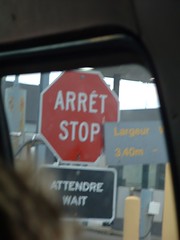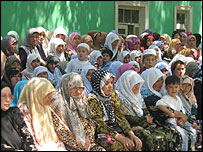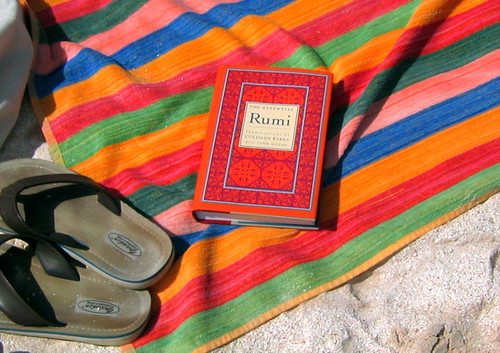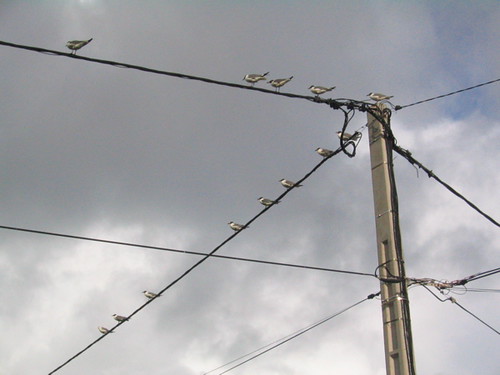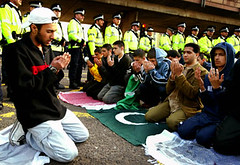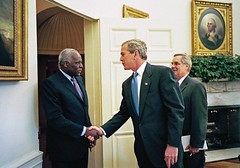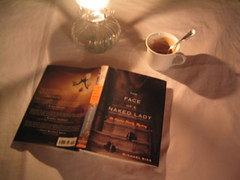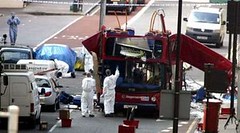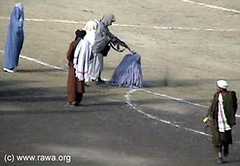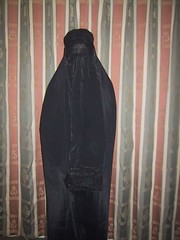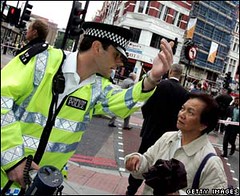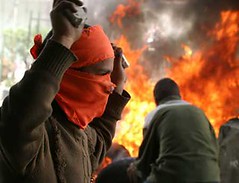What do the Belgians and the Irish have in common? Both have a stake in my daughter's DNA, but more to the point, both have a deep appreciation for the potato. Whereas the Irish treat the potato with a dull reverence deserved of a quintessential staple (think "colcannon," mashed potatoes with boiled cabbage), the Belgians have made the humble tuber sublime. They make
frites, or what Americans confusingly call "french fries."

I'm not bashing the French, who certainly do better fries than your average American restaurant. But
frites are not French. They're Belgian. The Inuits eat raw fish, but that doesn't make it sushi. We shouldn't be surprised that Americans managed to bungle the job of giving
frites a sensible name in English. After all, we stuck the Navaho and Sioux peoples with "Indian," we call Amish people of German ancestry "Dutch," and some Americans persist in referring to Jon Stewart as a "comedian." There are two plausible theories explaining how the french fry misnomer began. They may have been called "French" by soldiers in the first World War returning to the U.S. from southern Belgium (which is francophone, as is Brussels). Another possibility is that the "french" does not refer to France at all but is the term for a style of cut, "to french" meaning to cut into thin strips. So "frenched fried potatoes" becomes french fries.
Origins and etymology aside, Belgium is the indisputable center of the
frites universe. Or rather, Antoine's
friture in Place Jourdan in Brussels is the center. It's a circular structure in the middle of the square, and if you walk around back you'll see the peeling and hand-cutting of the potatoes. In front, you'll see a line stretching from the counter to the street, a line in which
les Bruxellois are content to wait a half-hour or more just to place their orders. This is not fast food. And it is well worth the wait.

Maison Antoine, Place Jourdan, Brussels
Belgian
fritures typically serve their product in either a paper cone or a waxed-cardboard boat. They are thicker than typical American fries, but not as thick as "steak fries." You will not find a trace of potato skin on any
frite. They are salted, but not so heavily that you feel salt on your tongue or that saltiness overwhelms the flavor. If you ask for ketchup you will not receive a scowl instead, but Belgian
frites usually come with an enormous dollop of mayonnaise and often with what they call pickles glopped over or next to that. The pickles are actually mustard with pickled gherkins, cauliflower, and onions. Some Belgians prefer more exotic sauces like curry-ketchup or samourai (which I think contains cayenne pepper). You're given a tiny plastic fork with which to maneuver the
frites out from under the mayo and into your mouth, a miniature utensil hardly up to the task, so grab some extra napkins. If you don't want to eat standing, take your meal to one of the outdoor tables in front of the bar facing the
friture. Order a beer--a
pression ("PREH-see-on," meaning draft)--and they won't mind you bringing your lunch. A bar cannot compete with the art of the
friture, so they co-exist in happy symbiosis. If you're with company, don't let the conversation postpone eating. Cold
frites are for seagulls.
The Belgians have achieved this level of perfection by adhering strictly to tradition, understanding that certain rules cannot be compromised when making
frites. First of all, bintje potatoes are the best choice, thanks to their starch and water content. They're hard to find in New York, and the ones I have seen are smaller than the Belgian variety. Regular Idaho Russet is the best stand-in for bintje. Avoid Yukon Gold, and never use potatoes that have been refrigerated. The cold makes them sweet. They should not be too new either, or they will brown too quickly. Peel all the skin off the potatoes and cut them into slices about a centimeter thick. Then cut each slice into slices. Try to keep the thickness uniform, so the cross section of each
frite is square, not rectangular. Drop the sliced potatoes into a bowl of cold water as you cut them so they don't oxidize while you're obsessing over getting a perfectly square cross-section.
Now about the oil. Belgians use fat. Though there are rumors that some
fritures use horse fat, beef fat is best. In Belgian supermarkets you can buy rendered beef fat called "Ossewit." It comes in 250 gram blocks of a pure white wax-like substance that will earn you some extra-special attention from U.S. Customs when you try to smuggle them back to New York, where beef fat is nearly impossible to get. Vegetable oil will not do, not if you want proper
frites, meaning ones that possess a subtle but unmistakable beefy taste and that do not leave a vegetable-oil film on your fingers and tongue long after the meal is done.
Frank and Mike are the father-son owners of Los Paisanos, the best butcher in Brooklyn and possibly in all of New York. They informed me that thanks to the encroachment of health codes on tradition, butchers there are no longer permitted to render beef fat. After some hunting around, they acquired a quantity of beef fat and passed it along to me for a decent price, but the catch was in the quantity: a single fifty-pound block. My family eats a lot of
frites, but I have a feeling some of that fat is going to waste.
If you cannot find beef fat, or if you value life more for its length than for its quality, use sunflower oil. My wife tells me in Greece they use olive oil, which I suppose gives you tasty fried potatoes that go soggy pretty quickly and cost a fortune to make.
Now the important part: cook the potatoes
twice. This rule is non-negotiable. Even McDonald's does it. The Belgians cook them first in fat heated to about 150 degrees centigrade. This cooks them part-way, so when they hit the second "bath" (at a much hotter 190 degrees centigrade) they don't turn into hollow shells with the consistency of old potato chips. Ever had a hollow french fry? That's why--no first bath. This also explains why some frozen fries seem to turn out better than home-made. Look at the bag, they've probably been blanched--cooked once already, either in water or vegetable oil. When we're doing a large, complicated dinner and don't have time to do three batches of
frites twice each at two temperatures, we use high-quality frozen fries (Terra brand are pretty good). A culinary sin, but only a venal one.
Before the first bath, take the sliced potatoes from the water and pat them dry (very dry, or you'll have to deal with lots of spattering). For the deep-frying, it's best to use a proper electric deep fryer with a basket. Fry them for about five minutes in fat or oil at 150 degrees centigrade (300 degrees Fahrenheit), just until they are cooked. They should not brown! If you're uncertain, take one out and stick it with a fork or snap it in two. If it's soft inside, that's enough. Remove the basket, shake the excess oil from the potatoes, and drop them in a bowl lined with a paper towel. Let them cool to room temperature (this is important). Do not salt them now.
Once the potatoes are cooled, raise the temperature of the fat or oil to 190 degrees centigrade (375 degrees Fahrenheit). The second bath is simpler, since you can judge when they're done by their color. This is of course also a matter of taste; most Belgian shops serve their
frites done light-golden brown, as in the photo above. They should take between five and ten minutes. Do not remove the basket and plunk the
frites onto a paper towel--salt them first. The easiest way to do this is over the sink while they're still in the basket, shaking the basket so they're salted evenly. If the
frites are properly salted, you won't need the paper towel, as the salt absorbs the excess grease. Don't pile them too high or the ones at the bottom will tend to go soggy from trapped moisture.
For mayonnaise, Hellman's is alright, though it has a slightly stiffer consistency than what you'd get in Brussels. The pickles are hard to get. Some supermarkets sell a British condiment called picalilly, which is a reasonable substitute. And for the beer, a Stella Artois will do just fine. But if what you want are french fries instead of the real
frites Belges, just drop a euro into France's culinary answer to Maison Antoine: the new "France Frites" machine. If forty-five seconds, out pop your "French fries."

And they say Americans are always screwing things up.
